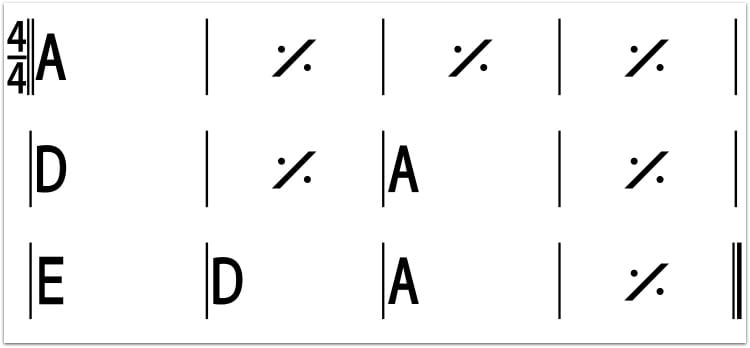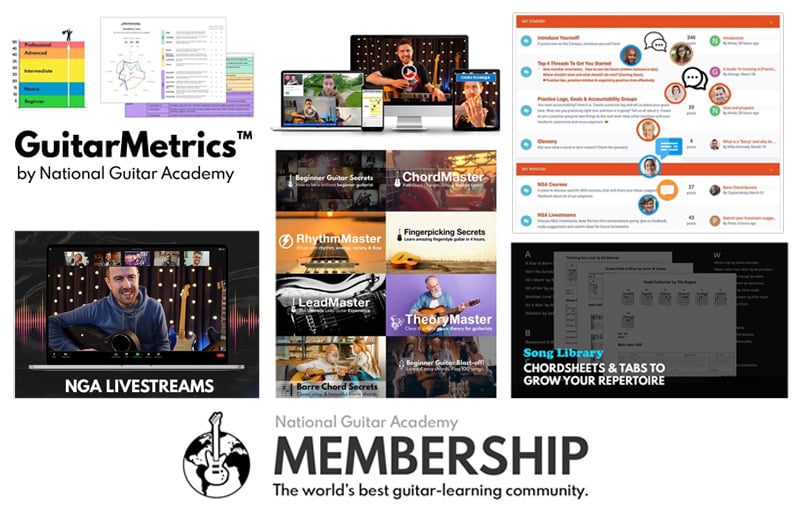Musical Keys
The definition of a musical key is often thrown around, this often means it can be difficult for guitarists to understand what they are.
Musical keys are a collection of notes that work well together. However, a musical key also contains chords.
We’ve already established that a C major scale has the following notes:
C D E F G A B
And that we can build chords off of those notes:
- C major.
- D minor.
- E minor.
- F major.
- G major.
- A minor.
- B diminished.
These notes and chords are what make up the key of ‘C’.
To learn more about guitar keys, go here: Guitar Keys: An Essential Guide
How Do I Find The Key of A Song?
99% of the time, you can tell the key of a song by:
Looking at the first and last chord of a progression.
Here’s an example:

From this we can tell this song is in the key of ‘A’. As the first and last chord are a ‘A’ chord.
What If The First Chord Isn’t The Key?
If you’re not sure on the key of a song, try playing a major scale over that chord progression.
If the scale is in the wrong key, you will know immediately. Experiment with a few different scales until you find one that fits.
Do Musical Keys Stay The Same In Music?
Musical keys change ALL the time. If everything was in the same key, music would become very boring very quickly!
Often, a song has a consistent key, however this can vary when songwriters borrow chords from other keys.
Usually to combat this, if we’re improvising or writing a melody, we would change our melodic notes to fit that particular chord.
However, don’t worry too much about this for now, just accept that it happens. The more you grow to learn about guitar theory, the more you’ll understand about key changes.
Now we understand what keys are, let’s take a look at how scales work in keys.
Scales That Work In The Key
As we found out earlier, the notes C, D, E, F, G, A and B are all notes which create the C major scale.
However, to play a scale in the key of C, we don’t actually need to play all of the notes.
A really great way to condense a scale down, is to play a pentatonic version of that scale.
If you wanted to play in the key of C, you could actually just play a C major pentatonic.
A C major scale, contains:
C D E F G A B
A C major pentatonic contains the notes:
C D E G A
Here’s a C major pentatonic:

Even though the pentatonic scale doesn’t sound as sophisticated as the full C major scale, it would still work over a chord progression in the key of C.
You could also do this with the relative minor scale, we’ve already discovered that A minor, was the relative minor of C major.
The notes in a A minor scale are:
A B C D E F G
The notes in the A minor pentatonic scale are:
A C D E G
Here’s the tab for a A minor pentatonic scale:

Learn this scale here: A Minor Pentatonic Scale: An Essential Guide
This means that, if you knew that a piece of music was in the key of C. You could use any of the following scales over it.
- C Major Scale
- C Major Pentatonic
- A Minor Scale
- A Minor Pentatonic
These all contains notes within the key of C, so they would all sound correct.
Want free guitar tips and video lessons delivered to your inbox?
Join over 100,000 guitar learners and subscribe to our guitar-tips-by-email service. (It's free.)
We'll send you a series of lessons that will move you to the next level of your guitar journey.
Learn how everything fits together quickly, easily and effectively. We share ninja tips (for instant fun!) but also timeless fundamentals that will deepen your understanding.

Our Guitar Courses
To become a better guitarist click here to see our guitar courses
Get your personalised guitar-learning plan 🎸
Want us to make a guitar-learning plan that is customised to you? Click here for GuitarMetrics™
How Do I Use Guitar Theory?
Picture the scene, you’ve spent hours and hours learning about guitar theory. But, you get to the band room and you just don’t know how to use it.
It’s great if you can learn guitar theory, however if you don’t know how and where to use it, knowing guitar theory is useless.
Here are 3 quick & easy ways to use guitar theory in a musical situation.
1) Guitar Theory Helps You Improvise Guitar Solos
Understanding guitar theory helps your solo skills. Understanding what guitar scales you can use over a chord progression is half the battle when improvising.
There’s nothing worse than struggling through a solo because you don’t understand understand the theory behind the music.
Knowing guitar theory puts a stop to your solo woes.
To learn how to solo, go here:

2) Guitar Theory Enhances Your Songwriting
Have you ever written a song? Thought it sounded great, but it just needed that finishing touch. An extra chord? A key change to take the song to a new direction? A new melodic idea?
For example, lets say that you’ve written a chord progression which has the chords C and F, but it just needed something a little extra.
You could:
- Add in an extra chord from the key of C to spice up the progression.
- Use scales to create a new melody over the stop.
- Change the key of a song.
Knowing guitar theory takes your songwriting to the next level.
3) Knowing Guitar Theory Enhances Your Musicality
Another great way of using guitar theory, is to add interest to chords and your own strumming patterns.
For example, let’s say we’re playing in the key of C, and the chords we’re using are C, Am and F.
As we know that the key of C, has no sharps or flats, we could actually use any of the open strings to add interest to these chords.
Learning guitar theory accelerates your progress as a guitar player.
However, we’ve only scratched the surface here. There’s a whole world of knowledge underneath the fretboard to discover.
Remember, guitar theory doesn’t turn you into a bad guitarist. It turns you into an excellent one.
What Type of Guitarist Are You?
Take our 60-second quiz & get your results: Take The Quiz
Join the world's best online guitar school 🌎
- Get your own personalised guitar learning plan (customised just for YOU).
- World-class online guitar courses. Learn at your own pace.
- Community Campus & Learning Forum - A friendly community! Connect with our team & students. 😊
- Beginner Song library with chordsheets, tabs and tips. (Songs suitable for all levels!)
- Regular live streams, seminars and Q&A sessions - Learn from world-class guitar educators. Get all your questions answered!
Click here to learn more about National Guitar Academy membership 
Cool Guitar T-shirts 😎
Look cooler! Check out our merch: Click here to see our merch store
Want free guitar tips and video lessons delivered to your inbox?
Join over 100,000 guitar-learners and subscribe to our guitar-tips-by-email service. (It's free.)
We'll send you a series of lessons that will move you to the next level of your guitar journey.
Learn how everything fits together quickly, easily and effectively. We share ninja tips (for instant fun!) but also timeless fundamentals that will deepen your understanding.

Popular Lessons
How To Learn Guitar: An 11-Step Programme For Beginners
How To Choose The Perfect Beginner Guitar
More Cool Guitar Stuff
Learn about National Guitar Academy: About Us
Join us on Facebook for daily guitar tips.
Listen to our Learn Guitar Podcast for rapid guitar progress.
Check out our free chord lessons.
Get our best guitar tips & videos



